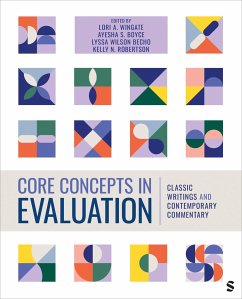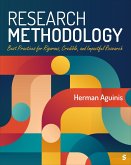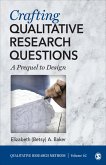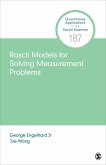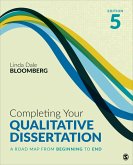Core Concepts in Evaluation
Classic Writings and Contemporary Commentary
Herausgeber: Boyce, Ayesha S.; Becho, Lyssa Wilson; Wingate, Lori A.; Robertson, Kelly N.
Core Concepts in Evaluation
Classic Writings and Contemporary Commentary
Herausgeber: Boyce, Ayesha S.; Becho, Lyssa Wilson; Wingate, Lori A.; Robertson, Kelly N.
- Broschiertes Buch
- Merkliste
- Auf die Merkliste
- Bewerten Bewerten
- Teilen
- Produkt teilen
- Produkterinnerung
- Produkterinnerung
This unique book features original writings from evaluation's foundational thinkers, together with new commentaries from contemporary authors. Each section includes an introduction to a core evaluation concept by the editors, a classic reading, two commentaries on that topic by contemporary authors, and a reflection guide written by the editors.
Andere Kunden interessierten sich auch für
![Proposal Writing Proposal Writing]() Soraya M. Coley (USA Cal Poly Pomona)Proposal Writing80,99 €
Soraya M. Coley (USA Cal Poly Pomona)Proposal Writing80,99 €![Student Study Guide With IBM® SPSS® Workbook for Research Methods, Statistics, and Applications Student Study Guide With IBM® SPSS® Workbook for Research Methods, Statistics, and Applications]() Kathrynn A. Adams (Guilford College)Student Study Guide With IBM® SPSS® Workbook for Research Methods, Statistics, and Applications80,99 €
Kathrynn A. Adams (Guilford College)Student Study Guide With IBM® SPSS® Workbook for Research Methods, Statistics, and Applications80,99 €![Research Methodology Research Methodology]() Herman AguinisResearch Methodology122,99 €
Herman AguinisResearch Methodology122,99 €![Crafting Qualitative Research Questions Crafting Qualitative Research Questions]() Elizabeth Baker (USA University of Missouri)Crafting Qualitative Research Questions52,99 €
Elizabeth Baker (USA University of Missouri)Crafting Qualitative Research Questions52,99 €![Rasch Models for Solving Measurement Problems Rasch Models for Solving Measurement Problems]() Engelhard, George, Jr.Rasch Models for Solving Measurement Problems52,99 €
Engelhard, George, Jr.Rasch Models for Solving Measurement Problems52,99 €![Introduction to Research Methods Introduction to Research Methods]() Bora PajoIntroduction to Research Methods145,99 €
Bora PajoIntroduction to Research Methods145,99 €![Completing Your Qualitative Dissertation Completing Your Qualitative Dissertation]() Linda Dale BloombergCompleting Your Qualitative Dissertation109,99 €
Linda Dale BloombergCompleting Your Qualitative Dissertation109,99 €-
-
-
This unique book features original writings from evaluation's foundational thinkers, together with new commentaries from contemporary authors. Each section includes an introduction to a core evaluation concept by the editors, a classic reading, two commentaries on that topic by contemporary authors, and a reflection guide written by the editors.
Produktdetails
- Produktdetails
- Verlag: SAGE Publications Inc
- Seitenzahl: 392
- Erscheinungstermin: 10. Oktober 2024
- Englisch
- Abmessung: 185mm x 233mm x 27mm
- Gewicht: 712g
- ISBN-13: 9781071883839
- ISBN-10: 1071883836
- Artikelnr.: 69234342
- Herstellerkennzeichnung
- Libri GmbH
- Europaallee 1
- 36244 Bad Hersfeld
- gpsr@libri.de
- Verlag: SAGE Publications Inc
- Seitenzahl: 392
- Erscheinungstermin: 10. Oktober 2024
- Englisch
- Abmessung: 185mm x 233mm x 27mm
- Gewicht: 712g
- ISBN-13: 9781071883839
- ISBN-10: 1071883836
- Artikelnr.: 69234342
- Herstellerkennzeichnung
- Libri GmbH
- Europaallee 1
- 36244 Bad Hersfeld
- gpsr@libri.de
Lori A. Wingate is the Executive Director of The Evaluation Center at Western Michigan University. She has a Ph.D. in interdisciplinary evaluation and 30 years of experience in the evaluation field. Dr. Wingate has led a range of evaluation projects in STEM education, public health, and higher education and has delivered more than 75 webinars and workshops on evaluation in various national contexts. She served as a subject matter expert in evaluation for the U.S. Centers for Disease Control and Prevention (CDC) for a decade and has held two intergovernmental personnel appointments at the CDC. She is a co-author of the fifth edition of Program Evaluation: Alternative Approaches and Practical Guidelines and co-led the creation of The Evaluation Center's online training program, Valeo. Ayesha S. Boyce is an associate professor in the Division of Educational Leadership and Innovation at Arizona State University. She also co-directs the STEM Program Evaluation Lab. Dr. Boyce's scholarship focuses on attending to value stances and issues related to diversity, equity, inclusion, access, cultural responsiveness, and social justice within evaluation--especially multi-site, STEM, and contexts with historically and systematically marginalized populations. She also examines teaching, mentoring, and learning in evaluation. She has evaluated more than 60 programs funded by the National Science Foundation (NSF), the US Department of Education, the National Institutes of Health, and Spencer and Teagle Foundations. Dr. Boyce is a 2019 American Evaluation Association (AEA) Marcia Guttentag Promising New Evaluator Award recipient and currently sits on the AEA board. Lyssa Wilson Becho is an evaluation scholar-practitioner. She works as a principal research associate at The Evaluation Center at Western Michigan University. Dr. Becho directs an evaluation capacity-building initiative funded by the U.S. National Science Foundation, focusing on developing capacity in evaluation practice and use for both evaluation practitioners and consumers. Her scholarship focuses on bridging evaluation theory to practice and making approaches to evaluation accessible. She has a Ph.D. in interdisciplinary evaluation and 10 years of experience evaluating local, state-, and nation-wide projects. Dr. Becho is also the co-executive editor of the Journal of MultiDisciplinary Evaluation. Kelly N. Robertson works as a principal research associate at The Evaluation Center at Western Michigan University. She has extensive experience conducting social justice-focused evaluations, publishing scholarly articles, and creating evaluation capacity-strengthening resources (e.g., webinars, guides, checklists). Dr. Robertson co-led the creation of The Evaluation Center's online training program, Valeo. She has a Ph.D. in interdisciplinary evaluation and over 15 years of experience in the field of program evaluation. She also has a master's degree in international development and a certificate in nonprofit leadership.
Introduction - Lori A. Wingate, Ayesha S. Boyce, Lyssa Wilson Becho, and
Kelly N. Robertson
Intended Audience
The Core Concepts
The Classic Pieces
Diverse Voices in Evaluation
Shining a Light on One Early Black Evaluation Scholar: Leander Boykin's
Commentary on the Nature of Evaluation
Structure of the Book
Positionality Statements
Introduction Classic Piece: Let's Eliminate the Confusion: What is
Evaluation? - Leander L. Boykin
What Evaluation Is Not
What Evaluation Is and Should Be
Part I. Evaluation is a distinct form of inquiry that is oriented to
reaching judgments of merit, worth, or significance.
Part I Introduction - Lyssa Wilson Becho
Valuing as a Core Evaluation Concept
The Classic Writing on Valuing
Evolution of Valuing in Evaluation
This Book's Contemporary Commentary on the Core Concept
End Notes
Part I Classic Piece: The Nature of Evaluation - Michael Scriven
Overview
The Nature of Evaluation
The Paradoxical Status of Evaluation
From Practice to Methodology to Discipline
The Country of the Mind
Criteria for a New Discipline
The Emerging Discipline of Evaluation
Midcourse Review
The Key Problem: The Validation of Evaluations
The Scope of Evaluation
Final Review
The State of Current Practice in Program Evaluation
Why Does All This Matter?
End Notes
Chapter 1: Amending the Architectural Blueprints for Evaluation - Bianca
Montrosse-Moorhead and Khalil Bitar
Scriven's Definition and Its Enduring Impact on Evaluation Scholarship and
Practice
Our Argument for Amending the Definition of Evaluation to Include Ethics
The Practical-Moral Obligations of the Evaluation Discipline
Renovating the Evaluation Building
An Amended Definition of Evaluation
Implications of the Amended Definition of Evaluation
Conclusion
Chapter 2: Lack of Discipline: Answering Scriven's Call for Value in
(Program) Evaluation - Ghislain Arbour
Introduction
Scriven's Call for Evaluation: About Value, Through Transdiscipline
Call Unanswered: The Case of Program Evaluation
Returning the Call: Program Evaluation as a Discipline
Conclusion: Toward (Common) Transdisciplinarity After All
Part I Reflection Guide - Lyssa Wilson Becho
Check Your Understanding
Consider Your Own Work
Extend Your Learning
Part II. Engagement enhances the usefulness and relevance of evaluation.
Part II Introduction - Kelly N. Robertson
Engagement as a Core Evaluation Concept
The Classic Writing on Evaluation Engagement
Evolution of Evaluation Engagement
This Book's Contemporary Commentary on the Core Concept
End Note
Part II Classic Piece: The Stakeholder Approach to Evaluation: Origins and
Promise - Carol Weiss
Critiques Point the Way to Something New
Early Reform Attempts
Development of the Stakeholder Model
Some Unresolved Issues
Promise of the Stakeholder Approach
The Stakeholder Approach in Action
Chapter 3: Evaluation Engagement: Historical Perspectives and New
Directions With Community-Based Participatory Research (CBPR) Principles -
Tatiana E. Bustos, Oyesola Oluwafunmilayo Ayeni, and Jessica S. Saucedo
Persistent Evaluation Challenges
Community-Based Participatory Action Research (CBPR) Principles
Conclusion
Chapter 4: I.M.P.A.C.T.: A Manumission Mindset and Other Engagement
Approaches for Evaluation - Sharon Attipoe-Dorcoo and Norma Martínez-Rubin
Introduction
Weiss's Classic Writing and Its Relation to Evaluation as an Engagement
Approach
Evolution of Engagement in Evaluation Practice
The IMPACT Framework and Engagement
IMPACT Framework Components and How to Apply Them to Community Engagement
Future of Evaluation Engagement for Manumitted Communities
Part II Reflection Guide - Kelly N. Robertson
Check Your Understanding
Consider Your Own Work
Extend Your Learning
Part III. Evaluation is inherently political.
Part III Introduction - Lori A. Wingate
Politics as a Core Evaluation Concept
The Classic Writing on the Inherently Political Nature of Evaluation
Evolution of the Framing of Politics in Evaluation
This Book's Contemporary Commentary on Politics and Evaluation
Part III Classic Piece: What Have We Learned About the Politics of Program
Evaluation? - Eleanor Chelimsky
Part 1: The Development of the Policy Question
Part 2: The Translation of the Policy Question Into an Evaluation Question
Part 3: The Translation of the Evaluation Question Into the Evaluation
Proper
Part 4: The Translation of the Evaluation Findings Into Policy Answers That
Respond to the Original Policy Question
Part 5: Use of the Evaluation Findings and the Generation of New Policy
Questions
What Have We Learned?
Chapter 5: The Power and Politics of Knowledge Production in Program
Evaluation: Funder, Methodological, and Pedagogical Colonialism - Jennifer
Billman and Bagele Chilisia
Introduction
Situating the Problem
A Path Forward: Decolonization Through Program Evaluation
Concluding Remarks
Chapter 6: Walking the Tightrope Between Independence and Responsiveness:
Falling Off Is Not an Option - Rakesh Mohan
Evaluations Are Inherently Political
Chelimsky's Five-Step Framework, Plus One, Is Needed to Manage Evaluation
Politics
What Do People Familiar With the Policy Process and Evaluation Say About
Evaluation Use and Politics?
Worthful Endeavor
Part III Reflection Guide - Lori A. Wingate
Check Your Understanding
Consider Your Own Work
Extend Your Learning
Part IV. Culturally responsive evaluation practice can lead to a more just
society.
Part IV Introduction - Ayesha S. Boyce
Cultural Responsiveness and Justice as Core Evaluation Concepts
The Classic Writing on Cultural Responsiveness
Evolution of the Framing of Culture in Evaluation
This Book's Contemporary Commentary on the Core Concept
Part IV Classic Piece: Responsive Evaluation Amistad Style: Perspectives of
One African American Evaluator - Stafford Hood
End Notes
Chapter 7: En Busca de las Voces Latinas in CRE: Reflections From a Program
Evaluation Latina - Grettel Arias Orozco
Introduction
Rethinking the Language and Terminologies
Complexity and Diversity of Latino/a/e/x Cultures
Promoting Awareness and Representation of Latino/a/e/x Evaluators
Chapter 8: Black Methodologies for Black Evaluators - Deja Taylor,
Sojourner White, Superior Murphy, Radaya Ellis, and monique liston
Evaluator Connection to Hood
Intro to Positionality
Culturally Responsive Evaluation (CRE)
Equitable Evaluation Framework (EEF)
Afrofuturist Evaluation (AFE)
Conclusion
Part IV Reflection Guide - Ayesha S. Boyce
Check Your Understanding
Consider Your Own Work
Extend Your Learning
Part V. Evaluation's value is realized through its use and influence.
Part V Introduction - Ayesha S. Boyce
Use as a Core Evaluation Concept
The Classic Writing on Use
Evolution of the Framing of Use in Evaluation
Part V Classic Piece: Utilization-Focused Evaluation - Michael Quinn Patton
This Book's Contemporary Commentary on the Core Concept
Utilization-Focused Evaluation
Chapter 9: Aims, Aspirations, and Consequences: Problematization at the
Intersection of Culture and Evaluation Use - Jeremy Acree and Jill
Chouinard
Utilization in Practice: An Empirical Perspective
Institutional Ethnography and Problematics
Intersections of Use and Culture
Looking Forward
Chapter 10: Beyond the Project: Using Evaluation to Reimagine the Future in
Africa - Caitlin A. Blaser Mapitsa and Mine Pabari
Use and a Changing World
Evolutions in Use
Evaluation and Use in Africa
Shifting From Useful to Transformative
Conclusion
Part V Reflection Guide - Ayesha S. Boyce
Check Your Understanding
Consider Your Own Work
Extend Your Learning
Part VI. Evaluation is a reflexive practice: Evaluation can and should be
evaluated.
Part VI Introduction - Lori A. Wingate
Metaevaluation as a Core Evaluation Concept
The Classic Writing on Metaevaluation
Evolution of the Concept and Practice of Metaevaluation
This Book's Contemporary Commentary on the Core Concept
Part VI Classic Piece: Metaevaluation - Daniel L. Stufflebeam
Background and Problems
A Conceptualization of Metaevaluation
Summary
Chapter 11: Revisiting Metaevaluation Through the Perspectives of the
Global South - Paidamoyo Chikate, Satlaj Dighe, Padma Kannan, and John M.
LaVelle
Metaevaluation's Origin and Development
Sociopolitical Contexts of the Global South
Reimagining Metaevaluation in the Global South
Summation
Chapter 12: A New Story for Metaevaluation - Tiffany Tovey and Libby Smith
What Is Metaevaluation?
What Is Reflective Practice?
Reflective Practice and Reflexivity in Evaluation
Old Story-New Story
Reconceptualizing Metaevaluation for the New Story
Conclusion and Call to Action
Part VI Reflection Guide - Lori A. Wingate
Check Your Understanding
Consider Your Own Work
Extend Your Learning
References
Author Index
Subject Index
Kelly N. Robertson
Intended Audience
The Core Concepts
The Classic Pieces
Diverse Voices in Evaluation
Shining a Light on One Early Black Evaluation Scholar: Leander Boykin's
Commentary on the Nature of Evaluation
Structure of the Book
Positionality Statements
Introduction Classic Piece: Let's Eliminate the Confusion: What is
Evaluation? - Leander L. Boykin
What Evaluation Is Not
What Evaluation Is and Should Be
Part I. Evaluation is a distinct form of inquiry that is oriented to
reaching judgments of merit, worth, or significance.
Part I Introduction - Lyssa Wilson Becho
Valuing as a Core Evaluation Concept
The Classic Writing on Valuing
Evolution of Valuing in Evaluation
This Book's Contemporary Commentary on the Core Concept
End Notes
Part I Classic Piece: The Nature of Evaluation - Michael Scriven
Overview
The Nature of Evaluation
The Paradoxical Status of Evaluation
From Practice to Methodology to Discipline
The Country of the Mind
Criteria for a New Discipline
The Emerging Discipline of Evaluation
Midcourse Review
The Key Problem: The Validation of Evaluations
The Scope of Evaluation
Final Review
The State of Current Practice in Program Evaluation
Why Does All This Matter?
End Notes
Chapter 1: Amending the Architectural Blueprints for Evaluation - Bianca
Montrosse-Moorhead and Khalil Bitar
Scriven's Definition and Its Enduring Impact on Evaluation Scholarship and
Practice
Our Argument for Amending the Definition of Evaluation to Include Ethics
The Practical-Moral Obligations of the Evaluation Discipline
Renovating the Evaluation Building
An Amended Definition of Evaluation
Implications of the Amended Definition of Evaluation
Conclusion
Chapter 2: Lack of Discipline: Answering Scriven's Call for Value in
(Program) Evaluation - Ghislain Arbour
Introduction
Scriven's Call for Evaluation: About Value, Through Transdiscipline
Call Unanswered: The Case of Program Evaluation
Returning the Call: Program Evaluation as a Discipline
Conclusion: Toward (Common) Transdisciplinarity After All
Part I Reflection Guide - Lyssa Wilson Becho
Check Your Understanding
Consider Your Own Work
Extend Your Learning
Part II. Engagement enhances the usefulness and relevance of evaluation.
Part II Introduction - Kelly N. Robertson
Engagement as a Core Evaluation Concept
The Classic Writing on Evaluation Engagement
Evolution of Evaluation Engagement
This Book's Contemporary Commentary on the Core Concept
End Note
Part II Classic Piece: The Stakeholder Approach to Evaluation: Origins and
Promise - Carol Weiss
Critiques Point the Way to Something New
Early Reform Attempts
Development of the Stakeholder Model
Some Unresolved Issues
Promise of the Stakeholder Approach
The Stakeholder Approach in Action
Chapter 3: Evaluation Engagement: Historical Perspectives and New
Directions With Community-Based Participatory Research (CBPR) Principles -
Tatiana E. Bustos, Oyesola Oluwafunmilayo Ayeni, and Jessica S. Saucedo
Persistent Evaluation Challenges
Community-Based Participatory Action Research (CBPR) Principles
Conclusion
Chapter 4: I.M.P.A.C.T.: A Manumission Mindset and Other Engagement
Approaches for Evaluation - Sharon Attipoe-Dorcoo and Norma Martínez-Rubin
Introduction
Weiss's Classic Writing and Its Relation to Evaluation as an Engagement
Approach
Evolution of Engagement in Evaluation Practice
The IMPACT Framework and Engagement
IMPACT Framework Components and How to Apply Them to Community Engagement
Future of Evaluation Engagement for Manumitted Communities
Part II Reflection Guide - Kelly N. Robertson
Check Your Understanding
Consider Your Own Work
Extend Your Learning
Part III. Evaluation is inherently political.
Part III Introduction - Lori A. Wingate
Politics as a Core Evaluation Concept
The Classic Writing on the Inherently Political Nature of Evaluation
Evolution of the Framing of Politics in Evaluation
This Book's Contemporary Commentary on Politics and Evaluation
Part III Classic Piece: What Have We Learned About the Politics of Program
Evaluation? - Eleanor Chelimsky
Part 1: The Development of the Policy Question
Part 2: The Translation of the Policy Question Into an Evaluation Question
Part 3: The Translation of the Evaluation Question Into the Evaluation
Proper
Part 4: The Translation of the Evaluation Findings Into Policy Answers That
Respond to the Original Policy Question
Part 5: Use of the Evaluation Findings and the Generation of New Policy
Questions
What Have We Learned?
Chapter 5: The Power and Politics of Knowledge Production in Program
Evaluation: Funder, Methodological, and Pedagogical Colonialism - Jennifer
Billman and Bagele Chilisia
Introduction
Situating the Problem
A Path Forward: Decolonization Through Program Evaluation
Concluding Remarks
Chapter 6: Walking the Tightrope Between Independence and Responsiveness:
Falling Off Is Not an Option - Rakesh Mohan
Evaluations Are Inherently Political
Chelimsky's Five-Step Framework, Plus One, Is Needed to Manage Evaluation
Politics
What Do People Familiar With the Policy Process and Evaluation Say About
Evaluation Use and Politics?
Worthful Endeavor
Part III Reflection Guide - Lori A. Wingate
Check Your Understanding
Consider Your Own Work
Extend Your Learning
Part IV. Culturally responsive evaluation practice can lead to a more just
society.
Part IV Introduction - Ayesha S. Boyce
Cultural Responsiveness and Justice as Core Evaluation Concepts
The Classic Writing on Cultural Responsiveness
Evolution of the Framing of Culture in Evaluation
This Book's Contemporary Commentary on the Core Concept
Part IV Classic Piece: Responsive Evaluation Amistad Style: Perspectives of
One African American Evaluator - Stafford Hood
End Notes
Chapter 7: En Busca de las Voces Latinas in CRE: Reflections From a Program
Evaluation Latina - Grettel Arias Orozco
Introduction
Rethinking the Language and Terminologies
Complexity and Diversity of Latino/a/e/x Cultures
Promoting Awareness and Representation of Latino/a/e/x Evaluators
Chapter 8: Black Methodologies for Black Evaluators - Deja Taylor,
Sojourner White, Superior Murphy, Radaya Ellis, and monique liston
Evaluator Connection to Hood
Intro to Positionality
Culturally Responsive Evaluation (CRE)
Equitable Evaluation Framework (EEF)
Afrofuturist Evaluation (AFE)
Conclusion
Part IV Reflection Guide - Ayesha S. Boyce
Check Your Understanding
Consider Your Own Work
Extend Your Learning
Part V. Evaluation's value is realized through its use and influence.
Part V Introduction - Ayesha S. Boyce
Use as a Core Evaluation Concept
The Classic Writing on Use
Evolution of the Framing of Use in Evaluation
Part V Classic Piece: Utilization-Focused Evaluation - Michael Quinn Patton
This Book's Contemporary Commentary on the Core Concept
Utilization-Focused Evaluation
Chapter 9: Aims, Aspirations, and Consequences: Problematization at the
Intersection of Culture and Evaluation Use - Jeremy Acree and Jill
Chouinard
Utilization in Practice: An Empirical Perspective
Institutional Ethnography and Problematics
Intersections of Use and Culture
Looking Forward
Chapter 10: Beyond the Project: Using Evaluation to Reimagine the Future in
Africa - Caitlin A. Blaser Mapitsa and Mine Pabari
Use and a Changing World
Evolutions in Use
Evaluation and Use in Africa
Shifting From Useful to Transformative
Conclusion
Part V Reflection Guide - Ayesha S. Boyce
Check Your Understanding
Consider Your Own Work
Extend Your Learning
Part VI. Evaluation is a reflexive practice: Evaluation can and should be
evaluated.
Part VI Introduction - Lori A. Wingate
Metaevaluation as a Core Evaluation Concept
The Classic Writing on Metaevaluation
Evolution of the Concept and Practice of Metaevaluation
This Book's Contemporary Commentary on the Core Concept
Part VI Classic Piece: Metaevaluation - Daniel L. Stufflebeam
Background and Problems
A Conceptualization of Metaevaluation
Summary
Chapter 11: Revisiting Metaevaluation Through the Perspectives of the
Global South - Paidamoyo Chikate, Satlaj Dighe, Padma Kannan, and John M.
LaVelle
Metaevaluation's Origin and Development
Sociopolitical Contexts of the Global South
Reimagining Metaevaluation in the Global South
Summation
Chapter 12: A New Story for Metaevaluation - Tiffany Tovey and Libby Smith
What Is Metaevaluation?
What Is Reflective Practice?
Reflective Practice and Reflexivity in Evaluation
Old Story-New Story
Reconceptualizing Metaevaluation for the New Story
Conclusion and Call to Action
Part VI Reflection Guide - Lori A. Wingate
Check Your Understanding
Consider Your Own Work
Extend Your Learning
References
Author Index
Subject Index
Introduction - Lori A. Wingate, Ayesha S. Boyce, Lyssa Wilson Becho, and
Kelly N. Robertson
Intended Audience
The Core Concepts
The Classic Pieces
Diverse Voices in Evaluation
Shining a Light on One Early Black Evaluation Scholar: Leander Boykin's
Commentary on the Nature of Evaluation
Structure of the Book
Positionality Statements
Introduction Classic Piece: Let's Eliminate the Confusion: What is
Evaluation? - Leander L. Boykin
What Evaluation Is Not
What Evaluation Is and Should Be
Part I. Evaluation is a distinct form of inquiry that is oriented to
reaching judgments of merit, worth, or significance.
Part I Introduction - Lyssa Wilson Becho
Valuing as a Core Evaluation Concept
The Classic Writing on Valuing
Evolution of Valuing in Evaluation
This Book's Contemporary Commentary on the Core Concept
End Notes
Part I Classic Piece: The Nature of Evaluation - Michael Scriven
Overview
The Nature of Evaluation
The Paradoxical Status of Evaluation
From Practice to Methodology to Discipline
The Country of the Mind
Criteria for a New Discipline
The Emerging Discipline of Evaluation
Midcourse Review
The Key Problem: The Validation of Evaluations
The Scope of Evaluation
Final Review
The State of Current Practice in Program Evaluation
Why Does All This Matter?
End Notes
Chapter 1: Amending the Architectural Blueprints for Evaluation - Bianca
Montrosse-Moorhead and Khalil Bitar
Scriven's Definition and Its Enduring Impact on Evaluation Scholarship and
Practice
Our Argument for Amending the Definition of Evaluation to Include Ethics
The Practical-Moral Obligations of the Evaluation Discipline
Renovating the Evaluation Building
An Amended Definition of Evaluation
Implications of the Amended Definition of Evaluation
Conclusion
Chapter 2: Lack of Discipline: Answering Scriven's Call for Value in
(Program) Evaluation - Ghislain Arbour
Introduction
Scriven's Call for Evaluation: About Value, Through Transdiscipline
Call Unanswered: The Case of Program Evaluation
Returning the Call: Program Evaluation as a Discipline
Conclusion: Toward (Common) Transdisciplinarity After All
Part I Reflection Guide - Lyssa Wilson Becho
Check Your Understanding
Consider Your Own Work
Extend Your Learning
Part II. Engagement enhances the usefulness and relevance of evaluation.
Part II Introduction - Kelly N. Robertson
Engagement as a Core Evaluation Concept
The Classic Writing on Evaluation Engagement
Evolution of Evaluation Engagement
This Book's Contemporary Commentary on the Core Concept
End Note
Part II Classic Piece: The Stakeholder Approach to Evaluation: Origins and
Promise - Carol Weiss
Critiques Point the Way to Something New
Early Reform Attempts
Development of the Stakeholder Model
Some Unresolved Issues
Promise of the Stakeholder Approach
The Stakeholder Approach in Action
Chapter 3: Evaluation Engagement: Historical Perspectives and New
Directions With Community-Based Participatory Research (CBPR) Principles -
Tatiana E. Bustos, Oyesola Oluwafunmilayo Ayeni, and Jessica S. Saucedo
Persistent Evaluation Challenges
Community-Based Participatory Action Research (CBPR) Principles
Conclusion
Chapter 4: I.M.P.A.C.T.: A Manumission Mindset and Other Engagement
Approaches for Evaluation - Sharon Attipoe-Dorcoo and Norma Martínez-Rubin
Introduction
Weiss's Classic Writing and Its Relation to Evaluation as an Engagement
Approach
Evolution of Engagement in Evaluation Practice
The IMPACT Framework and Engagement
IMPACT Framework Components and How to Apply Them to Community Engagement
Future of Evaluation Engagement for Manumitted Communities
Part II Reflection Guide - Kelly N. Robertson
Check Your Understanding
Consider Your Own Work
Extend Your Learning
Part III. Evaluation is inherently political.
Part III Introduction - Lori A. Wingate
Politics as a Core Evaluation Concept
The Classic Writing on the Inherently Political Nature of Evaluation
Evolution of the Framing of Politics in Evaluation
This Book's Contemporary Commentary on Politics and Evaluation
Part III Classic Piece: What Have We Learned About the Politics of Program
Evaluation? - Eleanor Chelimsky
Part 1: The Development of the Policy Question
Part 2: The Translation of the Policy Question Into an Evaluation Question
Part 3: The Translation of the Evaluation Question Into the Evaluation
Proper
Part 4: The Translation of the Evaluation Findings Into Policy Answers That
Respond to the Original Policy Question
Part 5: Use of the Evaluation Findings and the Generation of New Policy
Questions
What Have We Learned?
Chapter 5: The Power and Politics of Knowledge Production in Program
Evaluation: Funder, Methodological, and Pedagogical Colonialism - Jennifer
Billman and Bagele Chilisia
Introduction
Situating the Problem
A Path Forward: Decolonization Through Program Evaluation
Concluding Remarks
Chapter 6: Walking the Tightrope Between Independence and Responsiveness:
Falling Off Is Not an Option - Rakesh Mohan
Evaluations Are Inherently Political
Chelimsky's Five-Step Framework, Plus One, Is Needed to Manage Evaluation
Politics
What Do People Familiar With the Policy Process and Evaluation Say About
Evaluation Use and Politics?
Worthful Endeavor
Part III Reflection Guide - Lori A. Wingate
Check Your Understanding
Consider Your Own Work
Extend Your Learning
Part IV. Culturally responsive evaluation practice can lead to a more just
society.
Part IV Introduction - Ayesha S. Boyce
Cultural Responsiveness and Justice as Core Evaluation Concepts
The Classic Writing on Cultural Responsiveness
Evolution of the Framing of Culture in Evaluation
This Book's Contemporary Commentary on the Core Concept
Part IV Classic Piece: Responsive Evaluation Amistad Style: Perspectives of
One African American Evaluator - Stafford Hood
End Notes
Chapter 7: En Busca de las Voces Latinas in CRE: Reflections From a Program
Evaluation Latina - Grettel Arias Orozco
Introduction
Rethinking the Language and Terminologies
Complexity and Diversity of Latino/a/e/x Cultures
Promoting Awareness and Representation of Latino/a/e/x Evaluators
Chapter 8: Black Methodologies for Black Evaluators - Deja Taylor,
Sojourner White, Superior Murphy, Radaya Ellis, and monique liston
Evaluator Connection to Hood
Intro to Positionality
Culturally Responsive Evaluation (CRE)
Equitable Evaluation Framework (EEF)
Afrofuturist Evaluation (AFE)
Conclusion
Part IV Reflection Guide - Ayesha S. Boyce
Check Your Understanding
Consider Your Own Work
Extend Your Learning
Part V. Evaluation's value is realized through its use and influence.
Part V Introduction - Ayesha S. Boyce
Use as a Core Evaluation Concept
The Classic Writing on Use
Evolution of the Framing of Use in Evaluation
Part V Classic Piece: Utilization-Focused Evaluation - Michael Quinn Patton
This Book's Contemporary Commentary on the Core Concept
Utilization-Focused Evaluation
Chapter 9: Aims, Aspirations, and Consequences: Problematization at the
Intersection of Culture and Evaluation Use - Jeremy Acree and Jill
Chouinard
Utilization in Practice: An Empirical Perspective
Institutional Ethnography and Problematics
Intersections of Use and Culture
Looking Forward
Chapter 10: Beyond the Project: Using Evaluation to Reimagine the Future in
Africa - Caitlin A. Blaser Mapitsa and Mine Pabari
Use and a Changing World
Evolutions in Use
Evaluation and Use in Africa
Shifting From Useful to Transformative
Conclusion
Part V Reflection Guide - Ayesha S. Boyce
Check Your Understanding
Consider Your Own Work
Extend Your Learning
Part VI. Evaluation is a reflexive practice: Evaluation can and should be
evaluated.
Part VI Introduction - Lori A. Wingate
Metaevaluation as a Core Evaluation Concept
The Classic Writing on Metaevaluation
Evolution of the Concept and Practice of Metaevaluation
This Book's Contemporary Commentary on the Core Concept
Part VI Classic Piece: Metaevaluation - Daniel L. Stufflebeam
Background and Problems
A Conceptualization of Metaevaluation
Summary
Chapter 11: Revisiting Metaevaluation Through the Perspectives of the
Global South - Paidamoyo Chikate, Satlaj Dighe, Padma Kannan, and John M.
LaVelle
Metaevaluation's Origin and Development
Sociopolitical Contexts of the Global South
Reimagining Metaevaluation in the Global South
Summation
Chapter 12: A New Story for Metaevaluation - Tiffany Tovey and Libby Smith
What Is Metaevaluation?
What Is Reflective Practice?
Reflective Practice and Reflexivity in Evaluation
Old Story-New Story
Reconceptualizing Metaevaluation for the New Story
Conclusion and Call to Action
Part VI Reflection Guide - Lori A. Wingate
Check Your Understanding
Consider Your Own Work
Extend Your Learning
References
Author Index
Subject Index
Kelly N. Robertson
Intended Audience
The Core Concepts
The Classic Pieces
Diverse Voices in Evaluation
Shining a Light on One Early Black Evaluation Scholar: Leander Boykin's
Commentary on the Nature of Evaluation
Structure of the Book
Positionality Statements
Introduction Classic Piece: Let's Eliminate the Confusion: What is
Evaluation? - Leander L. Boykin
What Evaluation Is Not
What Evaluation Is and Should Be
Part I. Evaluation is a distinct form of inquiry that is oriented to
reaching judgments of merit, worth, or significance.
Part I Introduction - Lyssa Wilson Becho
Valuing as a Core Evaluation Concept
The Classic Writing on Valuing
Evolution of Valuing in Evaluation
This Book's Contemporary Commentary on the Core Concept
End Notes
Part I Classic Piece: The Nature of Evaluation - Michael Scriven
Overview
The Nature of Evaluation
The Paradoxical Status of Evaluation
From Practice to Methodology to Discipline
The Country of the Mind
Criteria for a New Discipline
The Emerging Discipline of Evaluation
Midcourse Review
The Key Problem: The Validation of Evaluations
The Scope of Evaluation
Final Review
The State of Current Practice in Program Evaluation
Why Does All This Matter?
End Notes
Chapter 1: Amending the Architectural Blueprints for Evaluation - Bianca
Montrosse-Moorhead and Khalil Bitar
Scriven's Definition and Its Enduring Impact on Evaluation Scholarship and
Practice
Our Argument for Amending the Definition of Evaluation to Include Ethics
The Practical-Moral Obligations of the Evaluation Discipline
Renovating the Evaluation Building
An Amended Definition of Evaluation
Implications of the Amended Definition of Evaluation
Conclusion
Chapter 2: Lack of Discipline: Answering Scriven's Call for Value in
(Program) Evaluation - Ghislain Arbour
Introduction
Scriven's Call for Evaluation: About Value, Through Transdiscipline
Call Unanswered: The Case of Program Evaluation
Returning the Call: Program Evaluation as a Discipline
Conclusion: Toward (Common) Transdisciplinarity After All
Part I Reflection Guide - Lyssa Wilson Becho
Check Your Understanding
Consider Your Own Work
Extend Your Learning
Part II. Engagement enhances the usefulness and relevance of evaluation.
Part II Introduction - Kelly N. Robertson
Engagement as a Core Evaluation Concept
The Classic Writing on Evaluation Engagement
Evolution of Evaluation Engagement
This Book's Contemporary Commentary on the Core Concept
End Note
Part II Classic Piece: The Stakeholder Approach to Evaluation: Origins and
Promise - Carol Weiss
Critiques Point the Way to Something New
Early Reform Attempts
Development of the Stakeholder Model
Some Unresolved Issues
Promise of the Stakeholder Approach
The Stakeholder Approach in Action
Chapter 3: Evaluation Engagement: Historical Perspectives and New
Directions With Community-Based Participatory Research (CBPR) Principles -
Tatiana E. Bustos, Oyesola Oluwafunmilayo Ayeni, and Jessica S. Saucedo
Persistent Evaluation Challenges
Community-Based Participatory Action Research (CBPR) Principles
Conclusion
Chapter 4: I.M.P.A.C.T.: A Manumission Mindset and Other Engagement
Approaches for Evaluation - Sharon Attipoe-Dorcoo and Norma Martínez-Rubin
Introduction
Weiss's Classic Writing and Its Relation to Evaluation as an Engagement
Approach
Evolution of Engagement in Evaluation Practice
The IMPACT Framework and Engagement
IMPACT Framework Components and How to Apply Them to Community Engagement
Future of Evaluation Engagement for Manumitted Communities
Part II Reflection Guide - Kelly N. Robertson
Check Your Understanding
Consider Your Own Work
Extend Your Learning
Part III. Evaluation is inherently political.
Part III Introduction - Lori A. Wingate
Politics as a Core Evaluation Concept
The Classic Writing on the Inherently Political Nature of Evaluation
Evolution of the Framing of Politics in Evaluation
This Book's Contemporary Commentary on Politics and Evaluation
Part III Classic Piece: What Have We Learned About the Politics of Program
Evaluation? - Eleanor Chelimsky
Part 1: The Development of the Policy Question
Part 2: The Translation of the Policy Question Into an Evaluation Question
Part 3: The Translation of the Evaluation Question Into the Evaluation
Proper
Part 4: The Translation of the Evaluation Findings Into Policy Answers That
Respond to the Original Policy Question
Part 5: Use of the Evaluation Findings and the Generation of New Policy
Questions
What Have We Learned?
Chapter 5: The Power and Politics of Knowledge Production in Program
Evaluation: Funder, Methodological, and Pedagogical Colonialism - Jennifer
Billman and Bagele Chilisia
Introduction
Situating the Problem
A Path Forward: Decolonization Through Program Evaluation
Concluding Remarks
Chapter 6: Walking the Tightrope Between Independence and Responsiveness:
Falling Off Is Not an Option - Rakesh Mohan
Evaluations Are Inherently Political
Chelimsky's Five-Step Framework, Plus One, Is Needed to Manage Evaluation
Politics
What Do People Familiar With the Policy Process and Evaluation Say About
Evaluation Use and Politics?
Worthful Endeavor
Part III Reflection Guide - Lori A. Wingate
Check Your Understanding
Consider Your Own Work
Extend Your Learning
Part IV. Culturally responsive evaluation practice can lead to a more just
society.
Part IV Introduction - Ayesha S. Boyce
Cultural Responsiveness and Justice as Core Evaluation Concepts
The Classic Writing on Cultural Responsiveness
Evolution of the Framing of Culture in Evaluation
This Book's Contemporary Commentary on the Core Concept
Part IV Classic Piece: Responsive Evaluation Amistad Style: Perspectives of
One African American Evaluator - Stafford Hood
End Notes
Chapter 7: En Busca de las Voces Latinas in CRE: Reflections From a Program
Evaluation Latina - Grettel Arias Orozco
Introduction
Rethinking the Language and Terminologies
Complexity and Diversity of Latino/a/e/x Cultures
Promoting Awareness and Representation of Latino/a/e/x Evaluators
Chapter 8: Black Methodologies for Black Evaluators - Deja Taylor,
Sojourner White, Superior Murphy, Radaya Ellis, and monique liston
Evaluator Connection to Hood
Intro to Positionality
Culturally Responsive Evaluation (CRE)
Equitable Evaluation Framework (EEF)
Afrofuturist Evaluation (AFE)
Conclusion
Part IV Reflection Guide - Ayesha S. Boyce
Check Your Understanding
Consider Your Own Work
Extend Your Learning
Part V. Evaluation's value is realized through its use and influence.
Part V Introduction - Ayesha S. Boyce
Use as a Core Evaluation Concept
The Classic Writing on Use
Evolution of the Framing of Use in Evaluation
Part V Classic Piece: Utilization-Focused Evaluation - Michael Quinn Patton
This Book's Contemporary Commentary on the Core Concept
Utilization-Focused Evaluation
Chapter 9: Aims, Aspirations, and Consequences: Problematization at the
Intersection of Culture and Evaluation Use - Jeremy Acree and Jill
Chouinard
Utilization in Practice: An Empirical Perspective
Institutional Ethnography and Problematics
Intersections of Use and Culture
Looking Forward
Chapter 10: Beyond the Project: Using Evaluation to Reimagine the Future in
Africa - Caitlin A. Blaser Mapitsa and Mine Pabari
Use and a Changing World
Evolutions in Use
Evaluation and Use in Africa
Shifting From Useful to Transformative
Conclusion
Part V Reflection Guide - Ayesha S. Boyce
Check Your Understanding
Consider Your Own Work
Extend Your Learning
Part VI. Evaluation is a reflexive practice: Evaluation can and should be
evaluated.
Part VI Introduction - Lori A. Wingate
Metaevaluation as a Core Evaluation Concept
The Classic Writing on Metaevaluation
Evolution of the Concept and Practice of Metaevaluation
This Book's Contemporary Commentary on the Core Concept
Part VI Classic Piece: Metaevaluation - Daniel L. Stufflebeam
Background and Problems
A Conceptualization of Metaevaluation
Summary
Chapter 11: Revisiting Metaevaluation Through the Perspectives of the
Global South - Paidamoyo Chikate, Satlaj Dighe, Padma Kannan, and John M.
LaVelle
Metaevaluation's Origin and Development
Sociopolitical Contexts of the Global South
Reimagining Metaevaluation in the Global South
Summation
Chapter 12: A New Story for Metaevaluation - Tiffany Tovey and Libby Smith
What Is Metaevaluation?
What Is Reflective Practice?
Reflective Practice and Reflexivity in Evaluation
Old Story-New Story
Reconceptualizing Metaevaluation for the New Story
Conclusion and Call to Action
Part VI Reflection Guide - Lori A. Wingate
Check Your Understanding
Consider Your Own Work
Extend Your Learning
References
Author Index
Subject Index

